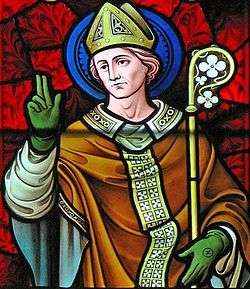Birinus
| Birinus | |
|---|---|
|
Stained glass window of St. Birinus at Dorchester Abbey | |
| Born |
c. 600 Francia (France) |
| Died |
3 December 649 Dorchester, Oxfordshire, kingdom of Wessex (England) |
| Major shrine | Dorchester Abbey, now destroyed. Small parts survive. Modern replica now in place. (Or Winchester Cathedral, now destroyed). |
| Feast | 3 December, 4 September |
| Attributes | bishop, sometimes baptising a king |
| Patronage | Berkshire; Dorchester |
| Controversy | body claimed by both Dorchester Abbey and Winchester Cathedral |
Birinus (c. 600 – 649), venerated as a saint, was the first Bishop of Dorchester,[1] and the "Apostle to the West Saxons" for his conversion of the Kingdom of Wessex to Christianity.
Life and ministry
After Augustine of Canterbury performed initial conversions in England, Birinus, a Frank, came to the kingdoms of Wessex in 634,[2] landing at the port of "Hamwic", now in the St. Mary's area of Southampton. During Birinus's brief time at Hamwic, St. Mary's Church was founded.[3]
Birinus had been made bishop by Asterius in Genoa,[4] and Pope Honorius I created the commission to convert the West Saxons.[5] In 635, he persuaded the West Saxon king Cynegils to allow him to preach. Cynegils was trying to create an alliance with Oswald of Northumbria, with whom he intended to fight the Mercians. At the final talks between kings, the sticking point was that Oswald, being a Christian, would not ally himself with a heathen. Cynegils then converted and was baptized.[6] He gave Birinus Dorchester-on-Thames for his episcopal see.[5] Birinus's original commission entailed preaching to parts of Britain where no missionary efforts had reached, and may have included instructions to reach the Mercians. But he ultimately remained in the West Saxon kingdom (Wessex).[7]
Birinus is said to have been very active in establishing churches in Wessex.[4] After Cynegils' death, the new king, Cenwalh, established a church at Winchester,[8] perhaps under Birinus' direction. He also supposedly laid the foundations for St. Mary's in Reading, Saint Helen's in Abingdon and other churches such as the church of St Peter and St Paul, Checkendon near Reading.[9] Tradition has it that Birinus built the first church at Ipsden, as a small chapel on Berins Hill, about two miles east of the present church.[10] According to the Anglo-Saxon Chronicle, Birinus baptised Cynegils's son Cwichelm (d. 636)[11] and grandson Cuthred (d. 661), to whom he stood as godfather.[12]
Veneration
Birinus' feast day is 3 December in the Roman Catholic Church,[13] but some churches celebrate his feast on 5 December. In the Church of England his feast day falls on 4 September and has the status of a Commemoration.[14] His relics were eventually translated to Winchester after his death.[15]
A small number of Church of England parish churches are dedicated to Birinus, including those at Berinsfield in Oxfordshire and Redlynch in Wiltshire. The Catholic church in the town of Dorchester, one of the first built after the Restoration of the Hierarchy by Pius IX, is also dedicated to Birinus.[16]
Citations
- ↑ Powicke, 1961, page 219
- ↑ Walsh, 2007, page 102
- ↑ Coles, 1981, page 6
- 1 2 Bede, 1969, 3.7
- 1 2 Kirby, 2000, page 38
- ↑ Patron Saints Index: Birinus Archived August 13, 2007, at the Wayback Machine.
- ↑ Kirby, 2000, page 51
- ↑ Kirby, 2000, page 45
- ↑ "History of St Peter & St Paul, Checkendon" at langtree.org
- ↑ "History of St Mary the Virgin, Ipsden" at langtree.org
- ↑ Anglo-Saxon Chronicle, an. 636
- ↑ Anglo-Saxon Chronicle, an. 639
- ↑ Catholic Online: Saints & Angels: St. Birinus
- ↑ Church of England Liturgical Commission, 2000, page 13
- ↑ Kirby, 2000, page 49
- ↑ "Welcome to the Catholic Church of St Birinus, Dorchester on Thames". stbirinus.co.uk. Retrieved 18 August 2013.
References
- Bately, Janet M. (1986). The Anglo-Saxon Chronicle: A Collaborative Edition. 3. Cambridge: D.S. Brewer. ISBN 0-85991-103-9.
- Bede (1969). Bede's ecclesiastical history of the English people. Oxford: Clarendon Press. ISBN 0-19-822202-5.
- Church of England Liturgical Commission (2000). Common Worship. Westminster: Church House Publishing. p. 13. ISBN 0-7151-2000-X.
- Coles, R.J. (1981). Southampton's Historic Buildings. City of Southampton Society. p. 6.
- Kirby, D. P. (2000). The Earliest English Kings. New York: Routledge. ISBN 0-415-24211-8.
- Powicke, F. Maurice; Fryde, E.B. (1961). Handbook of British Chronology (2nd ed.). London: Royal Historical Society.
- Walsh, Michael (2007). A New Dictionary of Saints: East and West. London: Burns & Oats. ISBN 0-86012-438-X.
External links
| Wikimedia Commons has media related to St. Birinus. |
- Ford, David Nash (2001). "St. Birinus (c. 600-649)". Royal Berkshire History. Nash Ford Publishing. Retrieved 16 June 2010.
- Kimball, Charles (1907). "St. Birinus (Berin)". Catholic Encyclopaedia. New Advent. Retrieved 16 June 2010.
- "St. Birinus". Catholic Online: Saints and Angels. Catholic Online. 2010. Retrieved 1 September 2007.
- "Birinus". Patron Saints Index. Retrieved 1 September 2007.
| Christian titles | ||
|---|---|---|
| Preceded by new foundation |
Bishop of Dorchester 634–649 |
Succeeded by Agilbertus |
